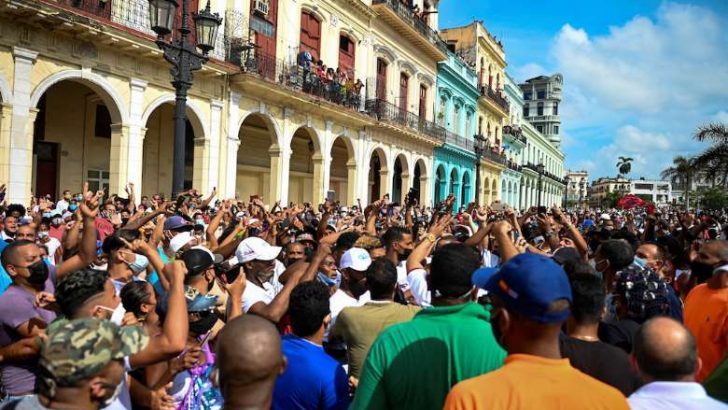On Sunday, July 11, the Christian Liberation Movement (MCL) called on Cubans to continue to pressure Cuban communist authorities to open general elections after thousands of people took the streets of major local cities to protest the unprecedented scarcity of essentials and the death rate produced by Covid-19.
After months of food and medicine shortages and the collapse of hospitals due to the pandemic, thousands of Cubans took to the streets shouting “Down with the dictatorship!”, “Homeland and life!”, “We want vaccines!”, and “We are not afraid!”, in the largest demonstrations that ever occurred in more than 60 years of Communist rule.
Protesters in some regions marched with the image of Our Lady of Charity, the national Marian advocate of Cuba.
Eduardo Cardet Concepción, National Coordinator of the MCL, released a statement received by ACI Prensa, saying that “thousands of Cubans are in the streets today peacefully demonstrating, demanding freedom and an end to repression and misery”. They are doing so, said MCL, “in order for the tyranny to end”.
“The MCL, as part of this people tired of oppression and injustice, is fully identified with their desires. We support our brothers and sisters of the Christian Liberation Movement and all Cubans who demonstrate peacefully, making use of this legitimate right,” the statement said.
The statement demands “the release of political prisoners, the annulment of the repressive laws against freedom, recognition of economic rights of free enterprise for Cubans, recognition of each Cuban’s – inside and outside the island – right to vote and to be elected.”
Statement
The statement concluded with the demands “[t]o hold elections with all these guarantees” and “Freedom Now!”
The MCL was founded by Catholic dissident Oswaldo Payá Sardiñas in 1988 to achieve a peaceful democratic reform in Cuba, explicitly inspired by the social doctrine of the Church. Taking advantage of a loophole in the Communist constitution, Mr Payá organised a collection of signatures to introduce democracy in Cuba. As a consequence, the movement was persecuted nationwide and 42 of its leaders ended up in prison during the 2003 wave of repression known as the “Cuban Spring”.
On July 22, 2012, Mr Payá and another MCL leader, Harold Cepero, were killed in a car accident in suspicious circumstances.
The Sunday wave of protests started in the western town of San Antonio de los Baños and promptly spread across the island to Havana and the eastern city of Santiago de Cuba.
In a message on radio and television, the president of Cuba, Miguel Díaz Canel, blamed most of the unrest on the US and called upon “all the revolutionaries in the country, all communists, to take to the streets and go to the places where these provocations are going to occur” to counteract protests, thus sparking fear of a civil confrontation.


 People take part in a demonstration against the government of Cuban President Miguel Diaz-Canel in Havana on July 11. Photo: AFP/UCAnews
People take part in a demonstration against the government of Cuban President Miguel Diaz-Canel in Havana on July 11. Photo: AFP/UCAnews